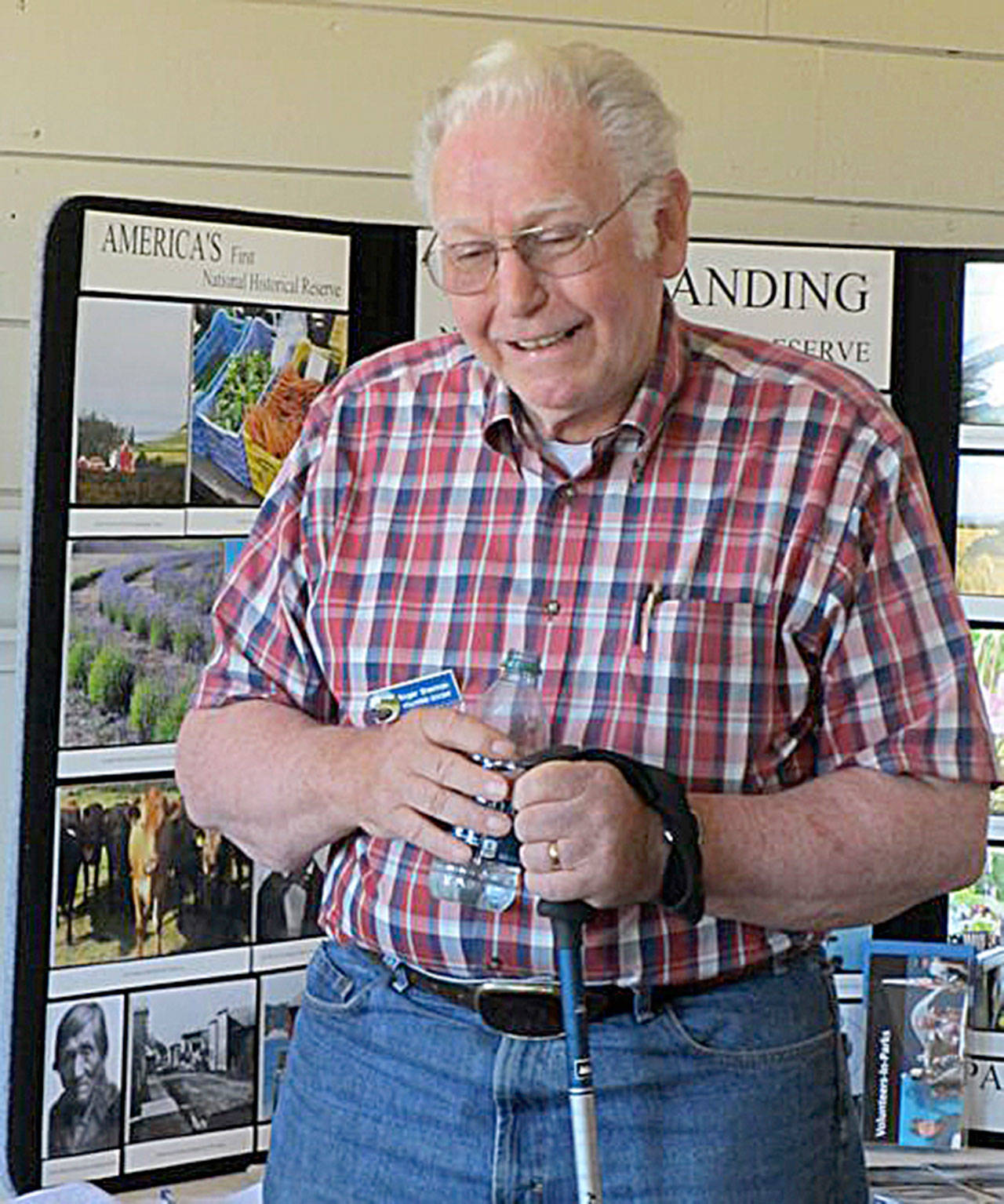Coupeville lost a celebrated historian, storyteller and an important link to the past Thursday when Roger Sherman passed away.
He was 84 years old.
“It’s an emotional time for a lot of us,” his longtime friend Ron Van Dyk said. “The Sherman family has been a real icon in this community for 100 years. It’s an end of an era, I’m afraid.”
Roger Sherman left his imprint on the Central Whidbey community in many ways. Although he lived in the small farming community for most of his life, only leaving for college and the Air Force, he lived a full and adventurous life.
Roger Sherman had deep roots in the community. The Shermans first came to Whidbey Island in the 1890s. His mother’s family, the LeSourds, were on the island about a decade earlier, according to Al Sherman, Roger’s older brother.
Al Sherman describes an idyllic childhood with his brothers. The island was overrun with bunnies when they were young, which was a great opportunity for boys and a “beagle hound” who loved hunting rabbits, he said.
They spent much of their time exploring the woods behind Sunnyside Cemetery and the bluff at Ebey’s Landing.
“We had a great life in Coupeville,” Al Sherman said.
Roger Sherman met his future wife, Darlene, when he was at Washington State University and she was going to the University of Idaho, his brother said.
Roger and Al Sherman both went into the service but returned in the 1950s to farm together with their father, Clark Sherman. They were known for raising turkeys but later turned to dairy after the market went bad. They continued farming together after their father retired.
They passed on the farm to their children after they retired.
In the 1970s, the brothers helped to create Ebey’s Landing National Historical Reserve, which covers most of Central Whidbey and preserves the historical, agricultural and cultural traditions of the scenic area.
The brothers agreed to trade the development rights on their property on Ebey’s Prairie for the adjacent Smith farm, which was owned by the U.S. Park Service and also came with a development easement. As a result, about 500 acres in the heart of the reserve are forever protected.
Al Sherman said they probably could have made a lot more money selling their property to developers, but their father taught them to value the land.
“That just wasn’t the way we were. Neither one of us,” he said. “We were pretty proud of what we did there.”
Van Dyk, who grew up in Oak Harbor, met Roger Sherman through his mother, Dorothy Sherman; Van Dyk and she were on the Island County Historical Society board together, he said.
The two men discovered they both liked skin and scuba diving and were soon on their way to many maritime adventures together, including an “interesting” nighttime dive at Bowman Bay, he said.
“He was the adventurous type,” Van Dyk said. “He was always doing great things.”
The two men mentored many youngsters in the Sea Scouts post in Oak Harbor over several decades, beginning in the 1960s. Roger Sherman truly enjoyed working with young people, Van Dyk said, “and was generous to a fault.” He was honored as a “captain” in the organization.
Van Dyk said he’s run into many grateful people who went through the program when they were young and still remember it well.
At one point, the men who ran the Sea Scouts got their hands on a surplus military boat from Alaska and fixed it up; Roger Sherman, who was “a jack of all trades,” used his impressive welding skills on the vessel, Van Dyk said.
Roger Sherman was both kind and accepting, his friends and family say. He welcomed girls into the Sea Scouts, for example, while others weren’t so sure, Van Dyk said.
Coupeville resident Michael Ferri said his husband, Jim Sherman, came out to the family at a time when society was less-than-accepting of gay individuals; Jim Sherman is Roger and Al Sherman’s brother. After a visit with the couple in San Francisco, Roger Sherman told his brother that Michael was welcome at his home anytime.
Jim Sherman and Ferri moved back to Coupeville about a dozen years ago.
“It was a generous gesture of a loving family man,” Ferri said.
“He was just a solid, salt-of-the-earth type of a guy,” he added. “Roger didn’t have a mean bone in his body.”
Roger Sherman picked up “the history bug” later in life, according Ferri, who is on the board of the Island County Historical Society. He was particularly interested in maritime history of Puget Sound and wrote a book, “The Sinking of the Calista.” Al Sherman said his brother’s research was painstaking and his dedication to accuracy was admirable.
“I was really proud of him for that,” his brother said.
One thing that was sure to get Roger Sherman riled up, his friends said, was someone spreading a historical inaccuracy.
Roger Sherman collected so many nautical artifacts over the years that he remodeled a room in his house to resemble a 19th century square-rig sailing ship.
He had been working on a second book for years and recently told friends and family that it was done. They hope it will be published.
Rick Castellano, executive director of the Island County Historical Museum, said Roger Sherman became the “local keeper of history,” as well as a part of it. A great storyteller, he lent his expertise to cemetery tours and many other talks over the years. More recently, he was a docent at the Jacob Ebey house.
Castellano said the museum has honored Roger Sherman at least twice for his contributions to island history.
“It’s like we’ve lost another son of the pioneers, and you don’t get more of those,” he said.



